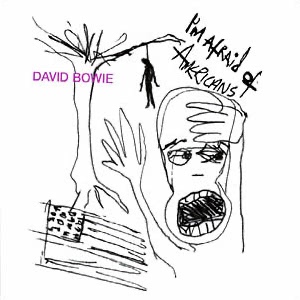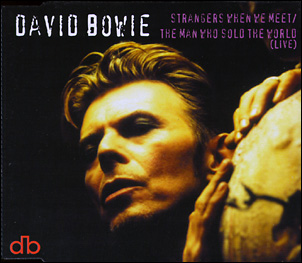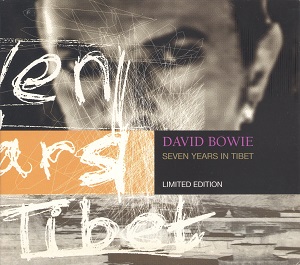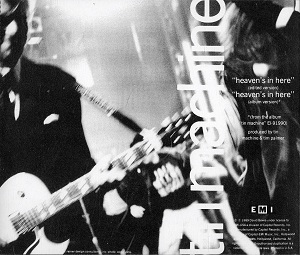
Earthling is the twenty-first studio album by the English musician David Bowie, released on 3 February 1997 through RCA Records in the United Kingdom, Virgin Records in the United States, and Arista Records/BMG in other territories. Mostly self-produced by Bowie, it was primarily recorded from August to October 1996 at New York City's Looking Glass Studios. Bowie composed the tracks with Reeves Gabrels and Mark Plati, who are credited as co-producers, with Mike Garson, Gail Ann Dorsey and Zack Alford providing overdubs later.

"I'm Afraid of Americans" is a song by the English musician David Bowie, released as a single from his album Earthling on 14 October 1997 through Virgin Records. The song was co-written by Bowie and Brian Eno and originally recorded during the sessions for Bowie's 1995 album Outside; this version was released on the soundtrack of Showgirls (1995). The song was then remade during the sessions for Earthling, featuring rewritten lyrics, overdubs and transposed verses. An industrial and techno track, it presents a critique of America through the eyes of a stereotypical "Johnny" and is characterised by drum patterns, synthesisers, various loops and vocal distortions.

Outside is the twentieth studio album by the English musician David Bowie, released on 25 September 1995 through Virgin Records in the United States and Arista Records, BMG and RCA Records in other territories. Reuniting Bowie with musician Brian Eno following the late 1970s Berlin Trilogy, the two were inspired by concepts "outside" the mainstream, such as various outsider and performance artists. Recorded throughout 1994, the experimental sessions saw Bowie conceive a world where "art crimes", such as murder, pervade society. The resulting Leon project initially faced resistance from labels due to its uncommercial nature. The project's bootlegging led to additional sessions in 1995 to revise the concept and record more commercial material, inspired by a diary Bowie wrote for Q magazine.

Hours is the twenty-second studio album by the English musician David Bowie. It was originally released on 21 September 1999 through the Internet on the artist's website BowieNet, followed by a physical CD release on 4 October through Virgin Records. It was one of the first albums by a major artist available to download over the Internet. Originating as a soundtrack to the video game Omikron: The Nomad Soul (1999), Hours was the final collaboration between Bowie and guitarist Reeves Gabrels, with whom he had worked since 1988. The album was recorded in mid-1999 between studios in Bermuda and New York City. A song contest conducted on BowieNet in late 1998 resulted in a fan contributing lyrics and backing vocals to one of the tracks.

The Buddha of Suburbia is the nineteenth studio album by the English musician David Bowie, originally released on 8 November 1993 through Arista Records in the United Kingdom and Europe. The project originated following an interview between Bowie and novelist Hanif Kureishi during a press tour for Black Tie White Noise (1993), where Bowie agreed to compose music for an upcoming adaptation of Kureishi's novel The Buddha of Suburbia (1990). After making basic tracks, Bowie decided to turn the project into a full album. Working with musician Erdal Kızılçay, recording took place at Mountain Studios in Montreux, Switzerland and was completed in six days; Mike Garson contributed piano overdubs.

"When the Wind Blows" is a 1986 song from the soundtrack of the film of the same name, performed by David Bowie and written by Bowie and Erdal Kızılçay. It was released as a single in October 1986 and released digitally in 2007.

"Baby Universal" is a song by Anglo-American hard rock band Tin Machine, released as the second single from their Tin Machine II album in October 1991.

"Strangers When We Meet" is a song by English musician David Bowie, originally recorded for his 1993 album The Buddha of Suburbia. In 1995, Bowie re-recorded the song for his 20th studio album, Outside (1995), and this version was edited and released in November 1995 by RCA as the second single from the album, paired with a reworked version of Bowie's 1970 song "The Man Who Sold the World". The double A-side reached number 39 on the UK Singles Chart. In Sweden, "Strangers When We Meet" peaked at number 56 in 1996.

"Look Back in Anger" is a song written by English artists David Bowie and Brian Eno for the album Lodger (1979). It concerns "a tatty 'Angel of Death'", and features a guitar solo by Carlos Alomar.

"Hallo Spaceboy" is a song by the English musician David Bowie from his 20th studio album, Outside (1995). It originated as an instrumental by Reeves Gabrels called "Moondust", which Bowie and Brian Eno stripped down and used to form the final track. An industrial rock and electronica number influenced by the Pixies and Nine Inch Nails, the song contains a hypnotic sound, with synthesisers, loops and distorted guitar lines. Lyrically influenced by Brion Gysin, the song contains images of apocalypse and continues the androgynous conundrums of former Bowie songs such as "Rebel Rebel".

"Little Wonder" is a song by English musician David Bowie, released as the second single from his 21st album, Earthling (1997). "Little Wonder" backed by three remixes, was issued on 27 January 1997. The single was a success, peaking at number 14 in the UK and topping the chart in Japan. The accompanying music video was directed by Floria Sigismondi and depicts Bowie at three different ages. Biographer David Buckley considers it a dance-oriented video rather than a rock one, reminiscent of Orbital's "The Box" (1996).

"Seven Years in Tibet" is a song written by English musician David Bowie and Reeves Gabrels from the 1997 album, Earthling. It was released as the album's fourth single. In some territories, a version of the song sung by Bowie in Mandarin Chinese was released as "A Fleeting Moment".

"Dead Man Walking" is a song by English musician David Bowie, released as the third single from his 21st studio album, Earthling (1997). Written by Bowie and Reeves Gabrels, it was a top 40 hit in the UK, peaking at number 32. Bowie described "Dead Man Walking" as his homage "to rock and roll that is still young while we are all growing old". As such, the lyrics reflect his thoughts on aging at this point in his career.

"Survive" is a song by the English musician David Bowie from his 1999 album Hours. It was later released in remixed form as the album's third single on 17 January 2000, reaching number 28 in the UK. Written by Bowie and Reeves Gabrels, it is a reflective number detailing the end of a relationship. Musically, it recalls the sound of Bowie's folk rock music of the late 1960s, and 1971's Hunky Dory. Its music video echoes the reflective quality of the recording, portraying Bowie levitating at a kitchen table with an egg. Praised as a highlight of Hours, Bowie performed "Survive" frequently through 1999 and 2000.

LiveAndWell.com is a 1999 limited edition live album by David Bowie. It was not available commercially and could only be acquired by being subscribed to BowieNet at the time. The album is made up of recordings from the 1997 Earthling Tour, featuring songs from the albums Outside (1995) and Earthling (1997)
The Outside Tour was a tour by the English rock musician David Bowie, opening in September 1995 and lasting over a year. The opening shows preceded the release of the 1. Outside album which it supported. The tour visited stops in North America and Europe.

The Earthling Tour was a 1997 concert tour by English musician David Bowie, in promotion of his album Earthling. The tour started on 7 June 1997 at Flughafen Blankensee in Lübeck, Germany, continuing through Europe and the Americas before concluding in Buenos Aires, Argentina on 7 November 1997.
Erdal Kızılçay is a multi-instrumentalist musician of Turkish birth. He has worked with, among others, David Bowie. He plays bass guitar, oud, drums, keyboards, trumpet and violin. He lives in Aegerten, Switzerland.

"Heaven's in Here" is the lead track from the eponymous debut album by the Anglo-American hard rock band Tin Machine. Written by David Bowie, it was released as a promotional lead single from the album in 1989.

Brilliant Adventure (1992–2001) is a box set by English singer-songwriter David Bowie, released on 26 November 2021. A follow-up to the compilations Five Years (1969–1973), Who Can I Be Now? (1974–1976), A New Career in a New Town (1977–1982) and Loving the Alien (1983–1988), the set covers the period of Bowie's career from 1992 to 2001, commonly regarded by analysts as an artistic renaissance following his commercially successful but critically maligned work in the 1980s. However, Bowie's 1988–1992 tenure with the hard rock group Tin Machine is excluded. The set comprises eleven compact discs or 18 LPs.
















